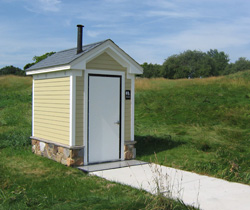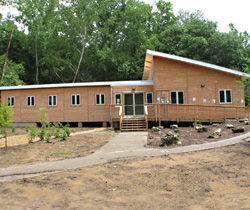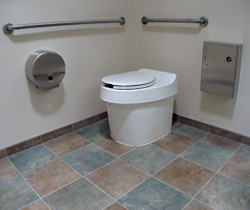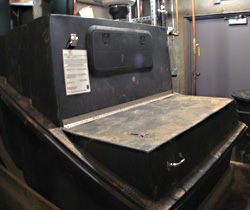Greetings from Clivus Multrum!
In this issue of the Natural Solution News we cover two very different Clivus Multrum installations. M54 Trailheads enhance the experience at Hershey Links Golf Course in central Pennsylvania and composting toilet and greywater systems help to achieve one of the first Living Building certifications at Washington University in Saint Louis.
A Sweeter Golfing Experience
 |
| The on-course restroom at Hershey Links is a kit built structure with composting system and Foam-flush toilet fixture. |
In the rolling hills of central Pennsylvania, Hershey Links offers a challenging and beautiful 18 holes of golf within sight of the city of Hershey. Part of the Hershey Golf Collection and owned by the Hershey Trust Company, Hershey Links opened in 2005.
In the Spring of 2010, two Clivus Multrum M54 Trailhead systems were installed to replace portable toilets on the course.
Course management wanted to provide a more comfortable experience for golfers while providing more privacy and enhancing the golfing experience at Hershey Links. According to course Superintendent, Matt Malick, they had considered a block built restroom but bringing water and sewer to the site would have been difficult.
Instead they opted for the Clivus Multrum M54 Trailhead system single-stall kit. The systems are also available in prefabricated form and as two-stall units. Composting toilet systems with Foam-flush toilets allowed Hershey Links the enhanced comfort they were looking for without the added disturbance of running sewer and water over the grounds.
| For any golfer familiar with portable toilets the Trailhead system with Foam-flush fixture is indeed an enhanced experience. |
Installation and assembly were simple and took one day for each unit. Clivus Multrum staff was on site to assist with the first unit. The only site disturbance was a four foot-deep hole for the composting unit. The lightweight, foam-core panel restroom structure was assembled on top of the compost unit. The M54 is available in a variety of finishes. Hershey links decided to provide their own finishes to duplicate the feel of other structures on the course.
For any golfer familiar with portable toilets the Trailhead system with Foam-flush fixture is indeed an enhanced experience. The five by eight foot interior is a comfortable space. The Foam-flush fixture is nothing like the offense golfers have come to expect with portable toilets. A fan continuously pulls air down the four-inch opening, making the toilet room completely odorless. The Foam-flush, which has the look and feel of a conventional toilet, uses just six ounces of water per visit. Water for the toilet comes from the course’s irrigation system so there was no additional site disturbance. With these advantages, the Foam-flush has become the standard fixture for golf course use of the Clivus Multrum M54.
Compost system maintenance for the new restrooms is being performed by Clivus. This entails start-up, mid-season, and shut-down visits by a trained, local service provider, working under Clivus supervision. All the course staff has to do is keep the restroom clean for golfers.
"To this point I have been happy with the performance of the Clivus Multrum units, and feel they were a good fit for our operation at Hershey Links” says Malick. Clivus Multrum has installed composting toilets on golf courses all across North America. As more and more golfers press for clean, odorless, on-course restrooms, the trend will continue.
The Living Building, Eliminating Waste
 |
| Tyson Living Learning Center the first Living Building uses composting toilet and greywater systems to eliminate water waste |
The International Living Building Institute (ILBI) certified its first two buildings in October 2010. Washington University’s Tyson Living Learning Center, 25 miles west of the St. Louis Campus, was one of those buildings, established, according to ILBI, as a step along “a visionary path to a restorative future.”
The Tyson Research Center’s LLC is a 2,900 sq. ft. field station and multi-use classroom which combines indoor and outdoor research and education in environmental science.
Recognizing sustainability as one of the biggest challenges of the 21st Century, the University and Tyson wanted to put their positions as community leaders and innovators to work in creating the greenest possible building. To that end, Dan Hellmuth of Hellmuth + Bicknese Architects recommended the Living Building Challenge (LBC) which offered a very lofty goal: eliminating the concept of waste.
| Having successfully eliminated waste by turning human excreta into valuable fertilizer the composting toilet and greywater systems at Tyson have been well received. |
The LBC has twenty imperatives in categories called Petals: Site, Water, Energy, Health, Materials, Equity and Beauty. All imperatives are mandatory and certification is based on real data; therefore the assessment did not take place until the building had been open for a year.
The Water Petal, one of the most difficult, requires that all water be collected on site and after use must be reused or sustainably released on site. The imperatives are respectively called Net-Zero and Ecological Water Flow
For Net-Zero, rainwater is treated for use at sinks. Clivus Multrum’s waterless composting toilet system greatly reduces the demand for water by eliminating water for toilet flushing. It converts the nutrients in human waste into safe and valuable fertilizer thus contributing to Ecological Water Flow. Waterless toilets save forty-thousand gallons of water annually when compared to conventional 1.6 gallon per flush toilets.
 |
| Waterless toilets at Tyson eliminate 40,000 gallons of water for flushing annually |
A mid-sized composter is located in the basement utility room directly below the bathrooms. Gravity carries waste from the toilet to the composting tank. Inside the tank composting is similar to the naturally occurring process on a forest floor. Liquid and solid materials are separated by gravity. As urine passes through the compost mass, it is transformed by bacteria into a stable, nitrate-rich solution. For every twenty uses, approximately one gallon of liquid is generated. It is automatically pumped from the compost unit and stored in a separate tank for periodic use as an on-site landscape fertilizer. Feces are transformed by bacteria, fungus, and red-wiggler worms. Wood shavings are added during periodic maintenance to achieve the optimal texture for composting. After several years solid end-product will be removed. Similar chemically, biologically and aesthetically to topsoil, it will serve as a soil conditioner on-site. As these processes are underway, a fan continuously pulls air down the toilet fixtures, ensuring an odorless restroom.
Water from all sinks collects in a tank of fifty gallons located in the utility room. When about 35 gallons has been collected, a pump sends it to an 18’x9’ planting bed where three 12” half pipes have been placed in the root zone of buttonbush plants. Aerobic activity in the soil stabilizes the organic contents, and native plants utilize both water and nutrients from soap contained in the water. There is no filtration before water is sent to the soil, and because greywater is relatively warm, the system doesn’t freeze in winter.
 |
| The composting tank at Tyson allows excreta to be transformed into valuable soil amendments |
The Clivus systems even contribute to both Beauty Petal imperatives. Tours of the facility, which contribute to Inspiration & Education imperative, have been frequent and the composting toilet system is a popular element. According to Kevin Smith, Associate Director at Tyson, visitors are surprised at how clean and odor-free the composting toilets are and fascinated by the behind-the-scenes composting process. Clivus end-products and greywater garden contribute to the Beauty & Spirit imperative by enhancing the landscape.
Having successfully eliminated waste by turning human excreta into valuable fertilizer the composting toilet and greywater systems at Tyson have been well received. Smith recommends them often and even appeared on NPR’s Science Friday to give a tour. As Tyson plans for further upgrades and expansion they are considering including Clivus Multrum composting and greywater systems wherever they are relevant. |
